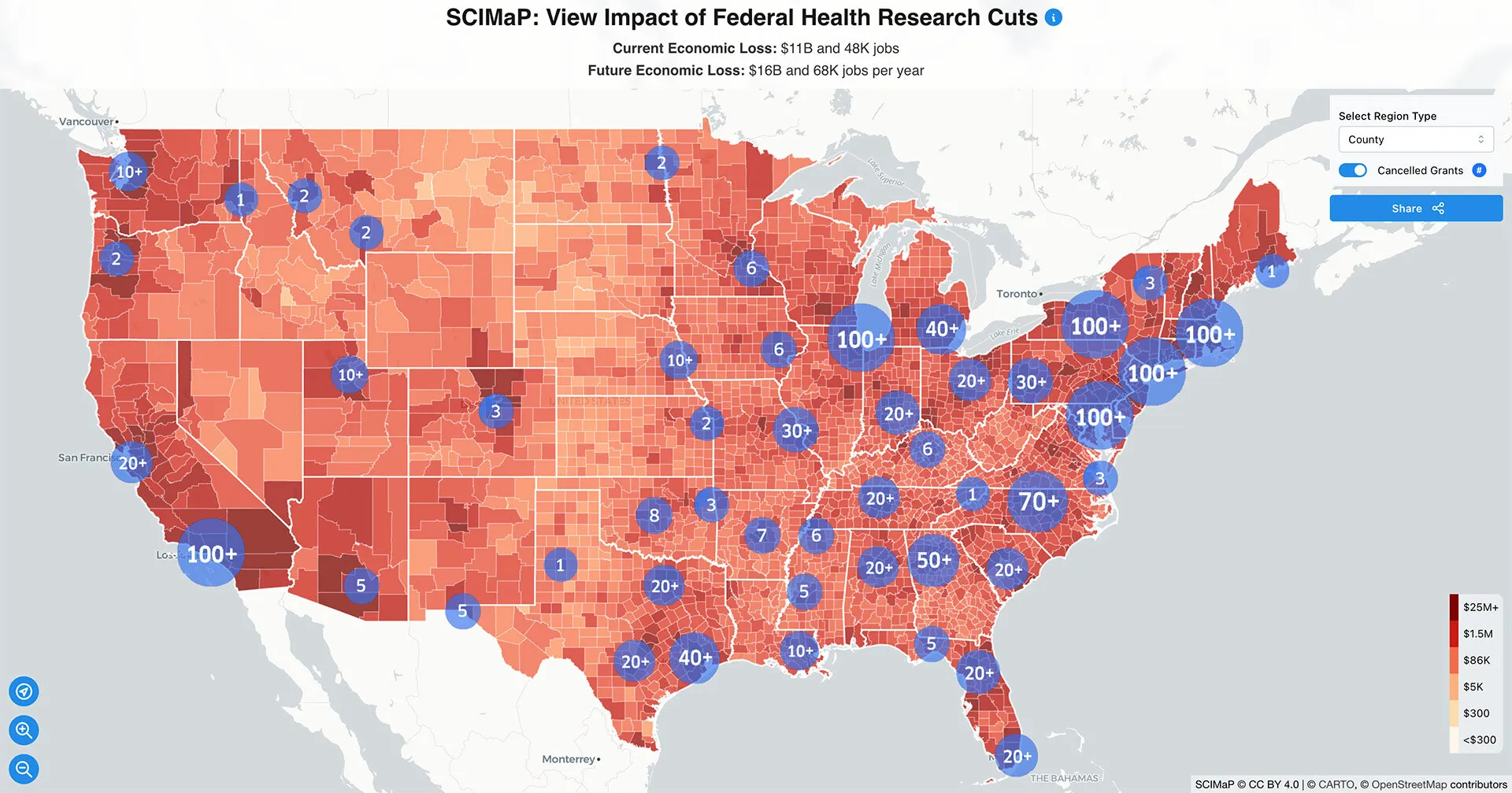- September 17, 2025
- By Katie Bemb
Researchers at the University of Maryland and the University of Pennsylvania are jointly leading efforts to communicate the impacts of ongoing and proposed cuts to federal funding for science and medical research that could cost hundreds of thousands of jobs, result in billions of dollars of economic losses and set back or end a vast array of research projects.
The interdisciplinary team previously developed an interactive, data-driven map to communicate the economic impact of sweeping cuts to federal funding for scientific and medical research, and has recently received a $336,000 award from the grantmaking organization Open Philanthropy to sustain and expand its project.
The team, which also includes researchers from the Georgia Institute of Technology, University of Utah and University of Oregon, launched the Science & Community Impacts Mapping Project (SCIMaP) in March. The interactive website communicates how National Institutes of Health (NIH) funding cuts—including reductions to research infrastructure funding (known as indirect costs), grant freezes and terminations, and proposed reductions in the NIH fiscal 2026 budget—result in economic and job losses at national, state, county and congressional district levels.
With the new funding from Open Philanthropy, the team plans to expand its analysis to other federal agencies, as well as to assess and communicate the effects of federal cuts on research projects, public health, the scientific workforce and the economy.
“The overwhelming majority of Americans want the same or more federal funding for research. However, ongoing cuts in funding, grant terminations and the withholding of allocated funds are already curtailing science and leading to job losses nationwide,” said project co-lead Joshua Weitz, professor of biology and Clark Leadership Chair in Data Analytics at UMD with a joint appointment in the University of Maryland Institute for Health Computing. “Our SCIMaP visualization and communication effort connects these policy changes with real-world impacts within local communities.”
The team estimates that, if implemented, NIH’s proposed drastic reduction in research infrastructure support would lead to an estimated $16 billion in economic loss and 68,000 jobs lost nationwide each year. Research grants that have been frozen and canceled are associated with additional losses of $11 billion and 48,000 jobs nationwide. Likewise, if the NIH FY26 budget were reduced 40% as the White House proposed, the SCIMaP team projects an economic loss of $47 billion and more than 200,000 jobs lost. Visitors to scienceimpacts.org can see estimated economic losses from budget cuts along with a breakdown of impacts to three major NIH institutes that focus on aging, cancer and infectious disease.
“Federal investment in scientific research leads to widespread benefits for people and communities nationwide,” said project co-lead Alyssa Sinclair, Joan Bossert Postdoctoral Fellow at UPenn’s Annenberg Public Policy Center and a researcher in the Communication Neuroscience Lab at the Annenberg School for Communication.
The SCIMaP team sourced its data from a public database of NIH grants, canceled and frozen grants from the Grant Witness (previously Grant Watch) database, and local geographic mobility data from census data records.
In recent years, more than $45 billion in NIH-funded medical research have been made possible annually through grant support to universities, hospitals and research institutes in communities across the U.S. Although less than 1% of the federal budget goes to the NIH, the investment has a significant positive impact on health innovation and the economy.
The United for Medical Research coalition estimates that every $1 invested in scientific research through the NIH produces $2.56 in new economic activity. Further, NIH research supports over 400,000 jobs across the U.S. Research funded by the NIH has led to major breakthroughs, including the prevention, treatment and cures for cancer, heart disease and Type 1 diabetes.

Topics
Research